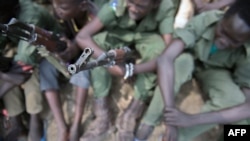The United Nations Office for the Coordination of Humanitarian affairs, or UNOCHA, says an estimated 30,000 people from South Sudan's Greater Pibor Administrative Area have fled their homes in the face of the recent inter-ethnic violence.
The clashes involving members of the Murle and Nuer communities have left close to 60 people dead, according to officials.
News reports say the trouble resulted from frequent conflict between youth from the two communities.
The U.N. says the violence has led to cattle raiding, destruction of properties, and displacement of thousands of people. Some 5,000 internally displaced people, or IDPs, including women and children, have arrived in Pibor town after fleeing the conflict-ridden areas of Gumuruk and Lekuangole in the Greater Pibor Administrative Area.
Sara Beysolow Nyanti, the U.N. humanitarian coordinator for South Sudan, said the ongoing conflict has resulted in the loss of lives and livelihoods.
"People have suffered enough. Civilians — especially those most vulnerable — women, children, the elderly and the disabled — bear the brunt of this prolonged crisis," Nyanti said.
Peter Nyang, a teacher, is one of the thousands of IDPs. Along with his wife and five children, Nyang fled Gumuruk when the attackers raided the village and torched his house.
"They have burned our houses to ashes, the whole of Gumuruk town they were burned to ashes," Nyang said. "We separated and ran to different directions, others crossed the river, my close relatives, I don't know where they are. My uncle, my grandmother, I don't know where they are."
The spokesperson for the chief in Greater Pibor administrative area, John Kaka, said Thursday the humanitarian needs for the displaced persons are immense and fears are rife that there could be an outbreak of diseases.
"We have hundreds and thousands of people displaced from Gumuruk and Likwangole. They are already at Pibor girls' and Pibor boys' primary school. There is no good water and there is no feeding," Kaka said. "So, we are asking international organizations who are supporting people on feeding. Help people who have been displaced."
Bol Deng Bol, chairperson of the Jonglei Civil Society Network (JCSN) and executive director of INTREPID South Sudan, said there is an urgent need to end the violence. He explained that the prolonged clashes could take a huge toll on the efforts to restore peace in South Sudan.
"There will be nothing constructive that will be done," Bol said. "Instead they will be deconstructing the recent peace efforts."
According to the United Nations, a projected 9.4 million people will need humanitarian assistance and protection next year. An estimated 2.8 million people are expected to face physical violence, including rape and other forms of gender-based violence, and they will need protection.




